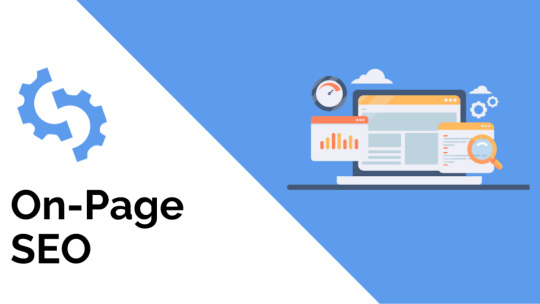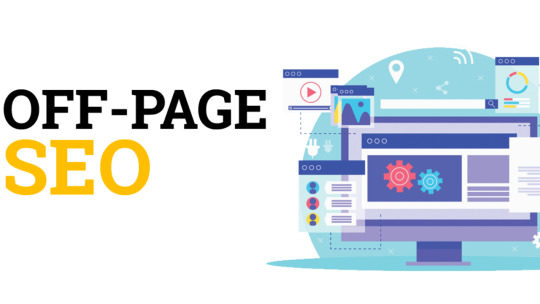Don't wanna be here? Send us removal request.
Text
On-Page vs. Off-Page: How Ecommerce SEO Services Cover It All
In operator words, it literally translates to finding, winning, and keeping customers in the fast and highly competitive e-commerce environment. Search Engine Optimization (SEO) particularly acts as a critical linkage in this process by making sure that your online store is well positioned in the search engine. To achieve comprehensive SEO success, it’s important to understand the two main pillars of SEO: On site optimization and off site optimization.
Although, we cannot overemphasize that both are very important for visibility and growth but play two different roles that need two different approaches. In this blog post, we are going to explain the difference between on-page SEO and off-page SEO, look into how on-page and off-page SEO interrelate and show how engaging professional ecommerce SEO services benefits your SEO strategy.

What Is On-Page SEO?
On-Page SEO deals with changes that are made on the website in order to make the website compliant with search engines as well as easily manageable by the users. This means making adjustments to elements in your website where you have complete control with the aim of raising your ranking and benefiting the users.
Key Components of On-Page SEO:
Keyword Optimization:
Searching and placing relevant search terms to the products and categories, articles and descriptions, titles and tags.
Targeting the specific query that is more likely to drive purchases using long-tail keywords.
High-Quality Content:
Delivering quality, entertaining and captivating material to your target market.
Making certain that the product descriptions, all articles featured on the blog, or any other content on your site are free of non-sensible writing while incorporating keywords.
Meta Tags:
Keyword placement in the meta titles and descriptions that attracts more clicks to the site and hence higher CTR.
Meta should have a title of less than sixty characters and the description of less than a hundred and sixty characters.
URL Structure:
Creating simple, clear, measurable, and keyword-based URLs (for example, your store for men’s running shoes: yourstore.com/mens-running-shoes >.
Internal Linking:
Building internal link structure for user and search engine navigation, getting users and search engines to the bigger and important pages to your site.
Image Optimization:
Reducing image size to enhance website’s loading rate.Providing alt text with proper keywords that will make SEO engines crawl on images.
Mobile-Friendliness:
Making sure your website is fully optimised and is usable on any device platform.
Page Load Speed:
Bare essentials, such as caching, image optimization and using a Content Delivery Network (CDN) to cut down the loading time of the said assets.
This lays the foundation for enhancing the online visibility of your website and ultimately the conversions On-Page SEO is about making your Web-site engine friendly and user friendly.

What Is Off-Page SEO?
On the other hand, off-page SEO is a process of optimizing your website through activities conducted beyond your web page in the online environment. These factors give an indication to the search engines that your website is a trustworthy site full of quality information and a right place for the users to come to.
Key Components of Off-Page SEO:
1.Backlink Building:
The case of attaining high-quality backlinks from authoritative relevant websites.
These are rights for other bloggers, and sharing business with influencers plus making posts that are easily shareable like infographics.
2.Social Media Marketing:
Presenting your content on social media platforms in order to get more traffic.
Earning the loyalty of the community that will in turn engage your company.
3.Influencer Outreach:
Cooperating with opinion leaders in order to sell your products and create demand on them.
The use of influencers generally can create more tangible benefits such as better brand reputation and higher traffic.
4.Brand Mentions:
Getting your brand or products featured on other sites without linking back to your site.
Testimonials, recommendations, and articles published on your site are an imperative to your website’s credibility.
5.Online Directories and Listings:
Having your business listed in the right directories include; Google My Business, Yelp and any directories relevant to your industry.
6.Content Promotion:
Frequent mailing and posting on forums to make people visit your site and pay attention to your posts.
7.Community Engagement:
Commenting on forums to demonstrate one’s authority, as well as driving traffic from sites such as Quora or Reddit.
Off-Page SEO is used to increase the credibility of your website and determine its rank, to attract traffic to it.
How On-Page and Off-Page SEO Work Together
Techniques used in on-page and off-page optimization are not vastly dissimilar and are in fact interrelated given the role of SEO marketing. Here’s how they work together:
Building a Strong Foundation:
On-page SEO prepares your website for all the traffic it shall be receiving. Even a great off-page campaign cannot be successful unless it has a strong on-page support to begin with.
Driving Traffic and Engagement:
Campaigns on other areas of the Web such as link development and promotion on social networks bring traffic to your site. On-page content hence holds high quality in order to keep the visitors captured within its demands and change their behavior.
Improving Domain Authority:
Off- page grows the website’s domain reputation, thus establishing your on- page content to a higher ranking system.
Enhancing User Experience:
On-page optimization enhances site usability through off page activities lure real and more likely to engage with your brand customers.
Reinforcing Brand Credibility:
Proper coordination of messages and quality of both on-page and off-page are influential to fully establish credibility of the brand.
The Role of ecommerce SEO Services
Currently, professional ecommerce SEO services are aimed at engaging all forms of on-site and off-site optimization for your online store as well as for the overall search rankings and attracting the relevant traffic. Here’s how they can help:
Comprehensive SEO Audits:
Recognition of such on-page problems as page speed, non-working links or the presence of duplicated content.
Measuring such factors of off-page optimization, for instance, quality of links, and any mention of the brand .
Strategic Keyword Research:
Using keywords that both suit your products and the potential prospects’ search intentions.
How to achieve relevance and traffic with short-tail and long-tail keywords.
Content Creation and Optimization:
Create persuasive product descriptions, blogs, and any other form of content that has been optimised for SEO.
Backlink Acquisition:
Earning high-quality backlinks through the construction of good relations with other sites.
How to maximize your outreach campaign to popularize your brand among the audience.
Performance Tracking and Reporting:
The use of analytics tools that exhibit the performance of your site as per SEO.
These are the capabilities of using data and knowledge to align strategies for consistent growth to happen.

Final Thoughts
On-page and off-page SEO are inseparable parts of the full SEO process and both will help enact the success of the ecommerce store. They found that proper optimization of internal components of the site and the creation of a strong external visibility will lead to increased relevance for the site in the search engine index, a corresponding influx of quality visitors, and subsequently higher conversion rates.
Appropriate ecommerce strategies will always work with an equilibrium between the two concepts. Working with professional ecommerce SEO services helps to gain positive outcomes since all types of SEO are taken into account, both on the site and outside of it. No matter whether you want to optimize your content,acquire high quality backlinks or fine tune your website, professional SEO services can help you at every turn.
Engage the best ecommerce solutions today to ensure your store stays relevant in the future of the continually progressing ecommerce Market.
2 notes
·
View notes